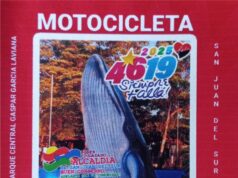A new Nicaraguan law that is aimed at homogenizing municipal advertising signage and taxes may have an effect on the countries corner stores (pulperias, distribuidoras and mini supers). The tax on signage could mean an end to their characteristic look which can be anything from a mass of advertising posters that have been stapled, stuck and taped to the store to a brightly colored hand painted mural advertising disinfectant.
Store owners will have to find a way of paying the taxes on what is considered advertising signage on the exterior of their premises. The Ley de Rótulos (Law of Signage) stipulates that any company that wishes to use the facade of a business premises in this way, must pay taxes to the municipality. If they don’t, the store owner will be responsible for doing so. Given the economic conditions facing these small enterprises (as well as the product suppliers being asked to pay the taxes), plain walls may be the order of the day.
Highway Signs
For years, municipalities have charged fees for various types and sizes of signs and this law will also serve to provide them with a proper reference in order to plan for an orderly control of the local environmental relating to private signage. In addition, the Ley de Rótulos provides local authorities with the legal instrument needed to properly regulate and control new installations as well as the removal and destruction of improperly placed and/or unpaid signs.
Taxes and Penalties
The new law establishes annual taxes in the case of advertising signage that range from US $ 5 to US $ 1,000 depending on size, type and whether affixed to land or buildings.
Those who do not comply with the payment of the municipal signage tax which must be paid at the beginning of January of each year will face a 5% fine based on the unpaid taxes. Larger signs will be subjected to a US $ 100 deposit paid in advance to cover the cost of local supervision services for the construction and installation process.
Exemptions to the taxes, fees and penalties established by this law are state institutions, the Nicaraguan Red Cross, firefighters, churches and regional governments are exempt







